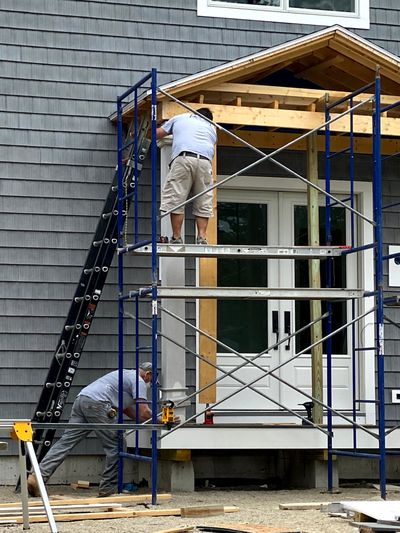Ask the Builder: Why you should want a covered front porch

Does your home have a covered front porch? Every house I’ve owned, except for the one I live in now (which I did not build), has had one. The first two homes I lived in had magnificent covered front porches that were as wide as the entire house.
The first was a craftsman-style home with the original giant iron eyelets in the ceiling put there to support a two-person porch swing. I’ll never forget that house, and each time I visit my hometown, I carve out time to drive by the modest home, park in front of it and reminisce about the wonderful nights spent on that porch with my new bride.
I was so lucky to grow up and start my career in Cincinnati. The city has an abundance of fine homes built in the late 1800s and early 1900s. While I didn’t appreciate it at the time because of a lack of life experience, I now realize the architects and builders back then were exceptionally wise.
It’s possible I could write a book about all of what I think they did to create houses that would stand the test of time, but today let’s just focus on covered front porches. A covered front porch is really an outdoor room.
Today many homeowners are trying to accomplish the same thing by putting a shade sail over an outdoor deck or patio. Little do they know, the concept of staying out of the sun and rain outdoors is by no means new.
It’s difficult to know what the primary purpose of a covered front porch was years ago, but I can tell you that front doors last so much longer if protected from the rain. Water commonly leaks into homes with front doors that are not covered if the requests for help streaming into my Ask Tim page at askthebuilder.com are any indication.
In fact, two years ago, I stopped by a house that was under construction just a mile from my own home. All of the siding was on, and the inside drywall had just been finished. Fortunately, there was no finished flooring installed.
There was no porch at the front door. I took a photograph of a huge water stain on the subfloor where water had pooled. A covered front porch would have prevented this, not to mention professionally installed flashing under the door.
If you’re planning to build a new home or do an extensive remodel of your existing home, give serious consideration to a front porch that’s got a nice roof over it. Be sure you make it at least 9 feet deep so you can put chairs, a love seat and possibly a small table on it and not be cramped for space.
A covered porch makes for a delightful outdoor playroom for children. I have a photograph of myself at age 5 or 6 playing a board game with my neighbor Cathy Conrad and her sister on their amazing covered porch.
Cathy was my age, and we’d often play on this porch in the summer during a rain shower. That way we stayed out of the way of Cathy’s mom, who was inside.
A covered front porch doesn’t have to be huge if all you want to do is protect your front door from all but the worst driving rainstorms. My daughter installed one on her new home that projects just 5 feet from the house and is about 12 feet wide. The only unfortunate thing is the front of the house faces west, and the door is not fully protected from direct punishing ultraviolet rays.
As you might suspect, I helped my daughter with her house plans. I insisted that the floor of the front porch be completely separated from the house to prevent any water damage to the house floor joists and sheathing.
Two poured concrete brackets were incorporated into the foundation. The top of these angle supports was 4 inches below the top of the foundation. I did this on purpose so no water that got on the brackets could seep into the crawlspace of the home.
The porch floor structure was built on these two brackets, and a 2-inch space was maintained between the finish siding of the house and the porch floor structure. This space allows for any water that gets on the porch floor to drain to the ground with no chance of it getting behind the house siding.
I also made sure the porch floor was a simple 7.5-inch step down from the main floor of the house. Once again, I had seen this for decades at all the older homes I worked on in Cincinnati. The architects and builders respected water and didn’t want it flowing under the front door.
I realize that, 100 years ago, homeowners used their front porches as their social media platform. You spent time on the porch to see who was doing what on your street. You were able to have conversations with neighbors walking by as you now do on your smartphone.
For this reason, you may want to put a smaller covered front porch on and spend your money on a much larger one in the back of your home where you can text, tweet and press the thumbs-up button in a more private setting. Have fun – and stay dry!
Subscribe to Tim Carter’s free newsletter at askthebuilder.com. Carter now does livestreaming video 1 p.m. Mondays through Fridays at youtube.com/askthebuilder.